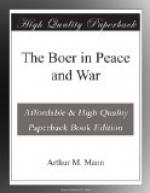Comparisons are odious, but let us compare the Boer with the English farmers. Should the harvests of the latter be destroyed (as in the case of an entire county of farmers in England at one time), ruin stares them in the face, showing that stock is of little moment. It is different in the case of the Boer. Take his stock away from him, and you deprive him of his daily bread. Of course, the facilities for successful cultivation in England are different from those in the Dutch Republics; at the same time, there is such a thing as irrigation, and were this resorted to more generally, and a larger area of land put under cultivation, the Boer farmer would be on a more stable footing.
A somewhat erroneous deduction has been gleaned by many people from guide-books, in which particulars are given respecting the limited extent of arable land available, but guide-book makers mostly prefer to guess at the figures rather than go to the trouble of ascertaining the truth. Without further reference to the guide-books, it is noteworthy that the possibilities of both the Transvaal and Free State, from an agricultural point of view, are greatly under-estimated, the fact being that a very small proportion of arable land is cultivated at all. In a number of cases water facilities are entirely ignored.
Wool is the current coin of the country with the Boer farmers, and the merchant who is desirous of continuing his business must have a certain amount of capital behind him, because the farmer likes to see money at least once a year. Things have changed somewhat now. In the olden days it was different. It was absolutely necessary then to put down a cheque for the full amount, but the average farmer is becoming less suspicious in transactions of this nature.
The life of the merchant during the wool season is not exactly a happy one. He likes to please his customers, but he does not always succeed. The average farmer who comes in with a load of wool has the appearance of a man whose primary intention is to buy up all the stores (although he may go away with a bag of coffee only), and afterwards consider with great deliberation the question of acquiring the whole town. All this is based upon the fact that he has a load of wool for sale. The merchant would rather give him five shillings than fivepence per pound, because it would be a certain sign that the good times had arrived. No matter, however, what price the merchant offers, your average farmer can always obtain more. He does not say where; he prefers to keep that up his sleeve. He also advances by farthings and halfpence, because he is chary about entering into the intricacies of eighths. He, moreover, strongly objects to accepting a lower price than that given to his neighbour. His neighbour may be an excellent man, and he may be in possession of very good sheep, but that his wool should be more valuable is not so apparent—is, in fact, most improbable. Every farmer has implicit faith in the merits of his own particular clip, and if differences really exist, he is prepared to state emphatically that the advantage is on his side.




